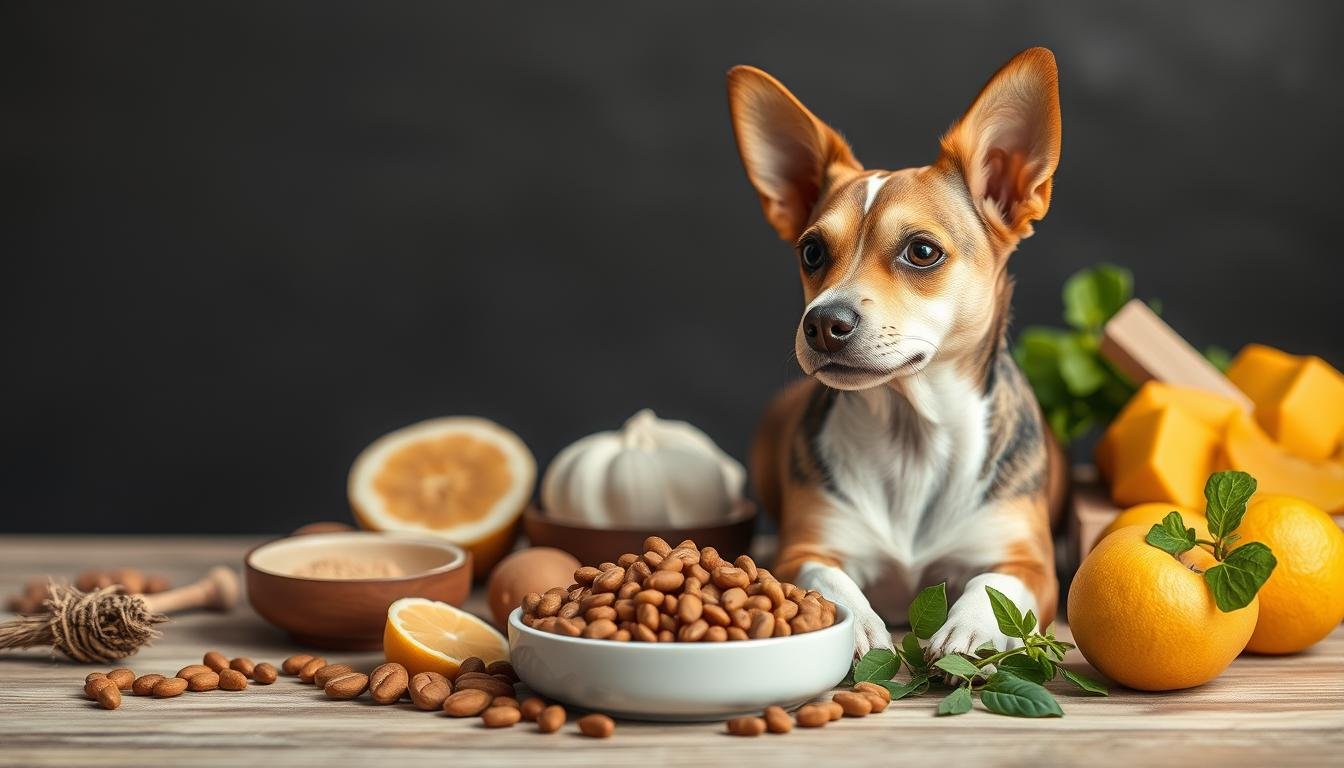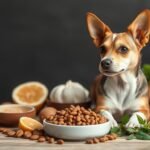As a responsible pet owner, knowing the basics of pet nutrition is key. It’s important to separate fact from fiction. Good pet care is vital for your pet’s health and happiness. Many pet owners are misled by common myths about pet nutrition, which can lead to poor dietary choices.
It’s crucial to understand the truth about pet nutrition to make informed diet choices. By debunking these myths, you can ensure your pet gets the best care. Pet owners should know how important proper care and nutrition are for their pets’ health and happiness.
Introduction to Pet Nutrition
Pet nutrition is a complex topic, filled with myths and misconceptions. As a pet owner, it’s important to stay informed and make decisions based on facts. This way, you can give your pet the best care and ensure they live a happy and healthy life.
Key Takeaways
- Understanding the basics of pet nutrition is essential for making informed decisions about your pet’s diet.
- Separating fact from fiction is crucial for providing proper pet care.
- Debunking common myths about pet nutrition can lead to better dietary choices.
- Proper pet care and nutrition are vital for keeping your pet healthy and happy.
- Staying informed and up-to-date on the latest pet nutrition research is essential for pet owners.
- Pet owners should prioritize their pet’s nutritional needs to ensure they receive the best possible care.
Understanding the Basics of Pet Nutrition
It’s key to give your pet the right nutrients for their health. Many pet owners think about pet adoption and their pet’s needs. Knowing about pet nutrition helps you choose the best food for your pet.
Macronutrients like protein, fat, and carbs are crucial for your pet’s health. Puppies and kittens need more protein to grow. This is important for their development.
The Role of Macronutrients in Pet Health
Macronutrients give energy and support growth. A balanced diet with the right mix helps keep your pet healthy. It also boosts their immune system and lowers disease risk.
Different Nutritional Needs for Different Life Stages
Each life stage has its own nutritional needs. Senior pets need more fiber and less protein than younger ones. Knowing this helps you pick the right food and supplements for your pet.
Species-Specific Dietary Requirements
Dogs and cats have unique dietary needs. Cats need more protein and specific nutrients like taurine. Understanding these needs helps you make the best diet choices for your pet’s health and happiness, especially after adoption.
Learning about pet nutrition ensures your pet gets the nutrients they need. Whether you’re adopting a pet or already have one, the right food and supplies support their health and happiness.
The Raw Food Diet Controversy
The debate about the raw food diet for pet owners, especially those with dogs, is ongoing. Some say it offers health perks like better digestion and a shinier coat. But others worry it could harm a pet’s health, pointing out the risk of bacterial contamination and nutritional imbalances.
Thinking about a raw food diet for your dog? It’s key to look at both sides. Some benefits include:
- Increased energy levels
- Improved dental health
- Reduced allergy symptoms
But, there are risks too, like the chance of getting salmonella or E. coli. As a caring pet owner, talking to a vet before changing your dog’s diet is crucial.
In the end, deciding on a raw food diet for your pet needs careful thought and a vet’s advice. By researching and knowing the pros and cons, you can choose what’s best for your dog’s health and happiness.
Grain-Free Diets: Separating Facts from Marketing
Many pet owners choose grain-free diets for their pets, thinking they’re healthier. But, it’s important to know the truth about grain allergies and diet links to heart disease. Keeping your pet clean is also key to their health, and a balanced diet is just part of it.
Here are some important things to think about with grain-free diets:
- Grain allergies are rare in pets, and most can eat grains just fine.
- Heart disease has been linked to some grain-free diets, but the cause is still a mystery.
- Grain-free diets might help pets with allergies, but they’re not needed for everyone.
For cats, a grain-free diet might be good if they’re allergic to grains. But, many cats do well on diets with grains. Regular grooming can also spot skin problems or allergies early, helping to prevent bigger issues.
In short, grain-free diets might be good for some pets, but always talk to a vet first. By knowing the facts and not just what’s marketed, you can choose the best diet for your pet. This includes regular grooming and a balanced diet.
| Pet Type | Dietary Needs | Grain-Free Option |
|---|---|---|
| Cats | High protein, moderate fat | May be beneficial for some cats with allergies or intolerances |
| Dogs | Varies by breed and size | May be beneficial for some dogs with allergies or intolerances |
Common Pet Food Label Misconceptions
Choosing the right food for your pet is crucial. Pet food labels can be tricky to understand. Look for keywords like “natural” or “organic,” but remember, these terms might not always mean what you think.
As a pet owner, you want the best for your pet. This includes pet insurance for vet bills and pet-friendly hotels for travel.
Here are some common misconceptions about pet food labels:
- Assuming that a higher price means better quality
- Not checking the ingredient list for fillers or by-products
- Believing that all “natural” or “organic” foods are created equal
By knowing these misconceptions and reading labels carefully, you can make better choices. This ensures your pet gets the nutrition they need to stay healthy.
“A healthy pet is a happy pet, and it starts with the right food and proper care, including pet insurance and access to pet-friendly hotels.”
| Pet Food Label Terms | Meaning |
|---|---|
| Natural | Derived from natural sources, but may still contain processing aids |
| Organic | Grown or produced without synthetic pesticides or fertilizers |
The Truth About Premium Pet Food Brands
Pet owners often wonder if premium pet food brands are worth the extra cost. Choosing the right food is crucial for a pet’s health and well-being. Pet training also strengthens the bond between pets and their owners.
When evaluating premium pet food brands, consider the quality of ingredients, manufacturing process, and nutritional content. High-quality ingredients are key to a pet’s health. Here are some benefits of premium pet food brands:
- Higher nutritional content
- Fewer fillers and by-products
- Improved digestibility
Premium pet food brands may cost more, but they offer long-term health benefits. Pet training is also vital for a pet’s well-being.
The choice between premium pet food brands depends on individual circumstances and priorities. By looking at ingredient quality, manufacturing process, and nutritional content, pet owners can make informed decisions. This includes pet training and care.
| Pet Food Brand | Quality of Ingredients | Nutritional Content |
|---|---|---|
| Brand A | High-quality protein sources | Rich in essential vitamins and minerals |
| Brand B | Whole grains and fruits | High in fiber and antioxidants |
Homemade vs. Commercial Pet Food
Choosing what to feed your pet can be tough. Many pet owners see pet supplies as key to their pet’s happiness. The right food is crucial for your pet’s health.
If you’ve adopted a pet recently, think about their diet. A balanced diet helps your pet stay healthy and avoid future health problems.
Homemade pet food lets you pick the ingredients and customize the diet. But, it takes time and might need a vet’s advice to ensure it’s nutritious.
Commercial pet food is easy and often meets nutritional standards. Your choice between homemade and commercial food depends on your situation and what’s best for you and your pet.
Think about your pet’s needs and research before deciding. Whether you pick homemade or commercial food, the key is a balanced and nutritious diet for your pet.
The Role of Supplements in Pet Nutrition
As a pet owner, you want the best for your furry friend, including their diet. A balanced diet is key, but supplements can also be vital. They help fill nutritional gaps and support your pet’s health.
It’s important to know what supplements are essential and which are optional. Essential supplements provide vital nutrients missing in your pet’s diet. Optional supplements offer extra benefits but aren’t necessary for health.
For example, omega-3 fatty acids are essential for dogs. They help keep their skin and coat healthy.
Essential vs. Optional Supplements
- Vitamin and mineral supplements to support overall health
- Probiotics to support digestive health
- Omega-3 fatty acids to support skin and coat health
As your pet ages, their supplement needs change. It’s important to consider age-related needs. For example, older pets might need joint supplements to stay mobile and comfortable.
Choosing the right supplements for your pet is crucial. Always consult with your vet. They can guide you on the best supplements for your pet’s health.
Protein Myths and Your Pet’s Health
Protein is key in pet nutrition. Yet, many pet owners don’t know how important it is. For cats, a diet rich in protein is vital for their health. A myth is that cats need a low-protein diet, but they actually thrive on a high-protein one.
Keeping your pet clean through pet grooming is also crucial. It prevents issues like matting and skin problems. It also cuts down on shedding and hairballs. For cats, grooming helps avoid hairballs and digestive issues.
Here are some key things to consider when it comes to protein and your pet’s health:
- High-quality protein sources, such as chicken or salmon, are essential for maintaining your pet’s health.
- A balanced diet that includes a mix of protein, fat, and carbohydrates is crucial for maintaining your pet’s overall health.
- Regular pet grooming can help prevent health issues and reduce the risk of digestive problems.
In conclusion, protein is vital in your pet’s diet, and pet grooming is key for their health. By understanding protein and grooming, you can keep your cats happy and healthy.
| Pet | Protein Requirements | Grooming Needs |
|---|---|---|
| Cats | High-protein diet | Regular grooming to prevent hairballs and skin irritation |
| Dogs | Balanced diet with moderate protein | Regular grooming to prevent matting and tangling |
Understanding Pet Obesity and Diet
Pet obesity is a big problem. It’s key to know how diet affects your pet’s health. A balanced diet is crucial for your pet’s well-being. When traveling, choose pet-friendly hotels and get pet insurance for the best care.
It’s important to spot unhealthy weight signs. Look for excess fat around the belly, low energy, and trouble moving. To avoid obesity, follow portion control tips:
- Measure your pet’s food accurately to avoid overfeeding
- Limit treats and snacks, which can be high in calories
- Choose a high-quality pet food that meets your pet’s nutritional needs
Keeping your pet at a healthy weight prevents many health problems. This includes diabetes and arthritis. It ensures your pet stays happy and active. Always talk to your vet for the best diet and exercise plan. Also, get pet insurance for unexpected vet bills.
When planning a trip with your pet, find pet-friendly hotels. Many hotels have dog parks and pet-sitting services. With the right diet, exercise, and care, your pet will thrive and live a long, healthy life.
| Pet Weight | Portion Size |
|---|---|
| Small (under 20 lbs) | 1/4 to 1/2 cup per 10 lbs |
| Medium (21-50 lbs) | 1/2 to 3/4 cup per 10 lbs |
| Large (51-90 lbs) | 3/4 to 1 cup per 10 lbs |
Special Dietary Needs for Senior Pets
As pets get older, their diet needs change. It’s key to give them the right food for their health. Proper pet care is very important at this time. Knowing their special diet needs can really help.
Senior pets need a balanced diet. This diet should meet their unique needs. Pet training is also important for managing age-related issues.
Some important things to consider for senior pet diets are:
- Easy-to-digest ingredients to reduce digestive issues
- Joint support for arthritis and mobility problems
- Antioxidants to fight age-related oxidative stress
- Managed calorie intake to avoid obesity and health problems
Regular vet visits and pet care talks can help find the best diet. Working with your vet and using pet training can ensure your senior pet gets the care they need.
By giving your senior pet a balanced diet and proper pet care, you can help them live well. Always talk to your vet before changing your pet’s diet or pet training routine.
| Dietary Consideration | Importance for Senior Pets |
|---|---|
| Easy-to-digest ingredients | Reduces digestive issues and discomfort |
| Joint support | Alleviates arthritis and mobility problems |
| Antioxidants | Combats age-related oxidative stress |
| Managed calorie intake | Prevents obesity and related health problems |
The Impact of Treats on Pet Nutrition
Treats can be fun for pets, but they affect their diet. As a pet owner, it’s key to think about the treats’ nutritional value. This ensures they fit well in your pet’s diet.
Choosing the right treats is vital for pet care. A good treat should be nutritious, tasty, and right for your pet’s size and diet. Here are some healthy treat options:
Healthy Treat Options
- Carrots and green beans: low-calorie, crunchy snacks that are perfect for dogs
- Sweet potato chews: a nutritious and easily digestible treat for dogs
- Freeze-dried liver or chicken: a protein-rich treat that’s perfect for cats and dogs
The 10% Rule for Treats
The 10% rule says treats should not make up more than 10% of your pet’s daily calories. For example, if your pet needs 1000 calories, treats should not have more than 100 calories. This rule helps ensure your pet gets the nutrients they need while enjoying treats.
By watching what treats you give and following the 10% rule, you help your pet get the best nutrition. A balanced diet is crucial for your pet’s health and happiness.
| Treat | Calories per serving | Suitable for |
|---|---|---|
| Carrots | 45 | Dogs |
| Sweet potato chews | 50 | Dogs |
| Freeze-dried liver | 20 | Cats and dogs |
Conclusion: Making Informed Decisions About Your Pet’s Diet
Deciding what to feed your pet is key to their health. Knowing about pet nutrition helps debunk myths. A balanced diet keeps your pet happy and healthy.
As your pet gets older, their diet needs change. It’s smart to keep up with these changes. Talking to your vet helps make sure you’re choosing the right food for your pet.
This article has given you the knowledge to make good choices for your pet’s diet. By focusing on their health, you ensure they get the best nutrition. This way, your pet can live their best life.












